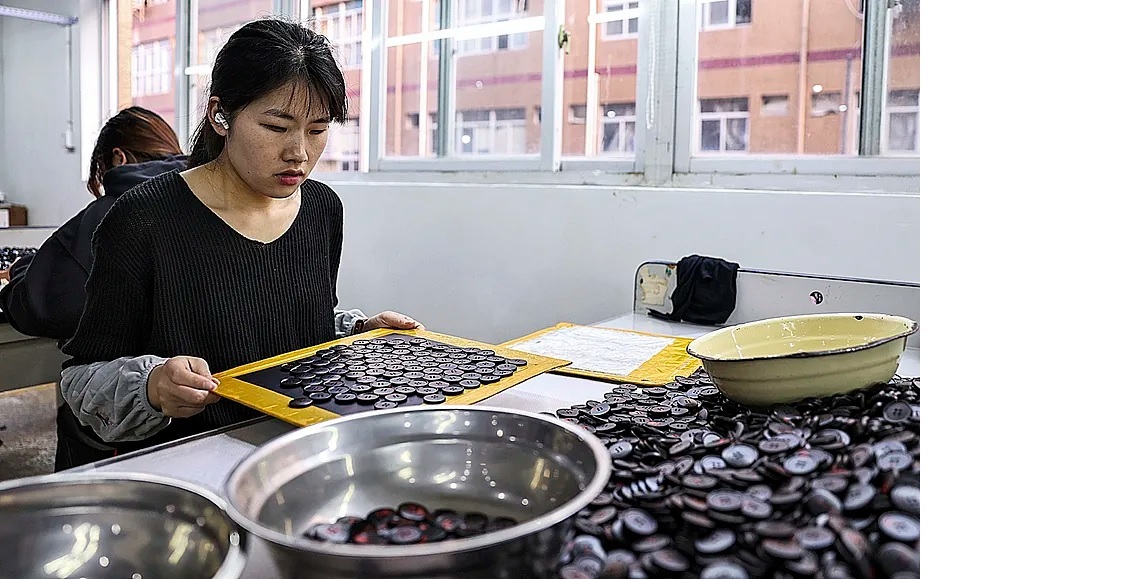Twice a week, every Wednesday and Saturday, an Airbus A359 with over 280 passengers operated by China Eastern takes off from Adolfo Suárez Madrid-Barajas Airport directly to Wenzhou. It is a prosperous coastal commercial center in the southeast of China, far from the fame of the giant Asian metropolises. It's as if Beijing had a direct air connection with Alicante. This would make sense if more than 200,000 migrants from the Valencian province and its surrounding towns were living in the Chinese capital. This is precisely, in reverse, the relationship that unites Wenzhou and Madrid.
The vast majority of Chinese traders who landed in Spain from the early 1990s until well into the 2000s came from Wenzhou and its neighboring county of Qingtian. "The direct flight from Madrid was inaugurated in 2023 due to the high demand," explains Yang Wei, a thirty-something who has been living in Madrid since he was eight years old and is returning to China with his whole family, including a baby, so that his grandparents can meet their grandson.
On this week's flight between Madrid and Wenzhou, covering 10,500 kilometers in just under 13 hours, there were two veteran Chinese entrepreneurs who made their fortune in Spain with bazaars and restaurants, and later opened button and footwear factories in their homeland that export worldwide. One of them, Chen Tang, mentions that they are returning to Wenzhou because they are very concerned about the tariffs imposed by the United States, one of the main markets for their business.
"With a 145% tariff on imported Chinese products, many of our clients have halted their orders, even some that were already in containers ready to ship," Chen explains. "We have some partners with factories in Vietnam where we are starting to move part of the production. From there, it will be sent to the United States to avoid the high tariffs, but this whole transfer process is very slow, and we are already incurring significant losses."
Wenzhou, whose name was adopted by the most famous Chinese supermarkets in Spain, is a city of nine million inhabitants that has continued to develop thanks to eager traders who have specialized in various industries and investments from many neighbors who did good business in southern Europe. The city is known within China by several nicknames: the cradle of Chinese capitalism, private economy, informal loans, epicenter of China's Catholic community, the world capital of buttons, footwear, glasses, sex dolls...
"In the 1980s, during the era of reform and opening up, Wenzhou served as a test model as one of the first cities to open to foreign investment and boosted its manufacturing industry of basic products for export," explains Ju Ma, a Spanish investor of Chinese descent, summarizing what is popularly known in the country as the Wenzhou Model.
This is also well explained in a report by the People's Daily, the official newspaper of the ruling Communist Party: "Wenzhou seized the opportunities of China's opening up to transform from a humble mountainous city on the coast into a prosperous business center. As China opened its doors to the outside world, facilitating travel abroad, emigration from Wenzhou also soared. However, it was mainly people from the surrounding rural areas who left, establishing an important commercial network in Europe."
In Wenzhou, according to internal figures, 60% of the world's buttons are produced (there are over 250 companies manufacturing 60 billion buttons in the neighboring municipality of Qiaotou, employing around 16,000 people), a quarter of the glasses, and a tenth of the shoes (there are over 4,000 footwear companies producing one out of every seven pairs of women's shoes sold worldwide).
It is an important manufacturing center that has been enduring the continuous tariff blows from US President Donald Trump throughout April, who this week stated that he would reduce tariffs on imported Chinese products. A more conciliatory move than in Beijing, although they do not trust the intentions of the always unpredictable Trump, seeing it as a strategy to pave the way for the two superpowers to start their negotiations to reach a trade agreement. "If the US really wants to solve the problem, it should listen to the rational voices of the international community and completely abolish all unilateral tariffs on China," said He Yadong, spokesperson for the Ministry of Commerce on Thursday, who denied that his country, as Trump had claimed, had already initiated those negotiations.
Wenzhou is one of the Chinese corners with a well-oiled commercial machinery eagerly awaiting the end of the tariff war between Washington and Beijing. This city, before the migratory wave to Europe, gained media notoriety within China as the city that received the country's first private business license, granted in 1980 to a button manufacturer named Zhang Huamei. "China's economic miracle began with Zhang," reads the start of an interview conducted by the state news agency Xinhua. "My life has always been like a button: small, but not insignificant. If a small button can make a difference, a woman like me could also take the lead in the business arena," Zhang stated.
While the private sector currently contributes to 60% of China's total GDP, in Wenzhou, it represents over 90%. "China's best businessmen have always come from here," says the owner of a modern café who spent a decade working in the Italian city of Prato. According to the man, his family continues in Italy with textile businesses. There are around 700,000 people from Wenzhou and its surroundings scattered across a hundred countries, representing the largest Chinese community abroad.
